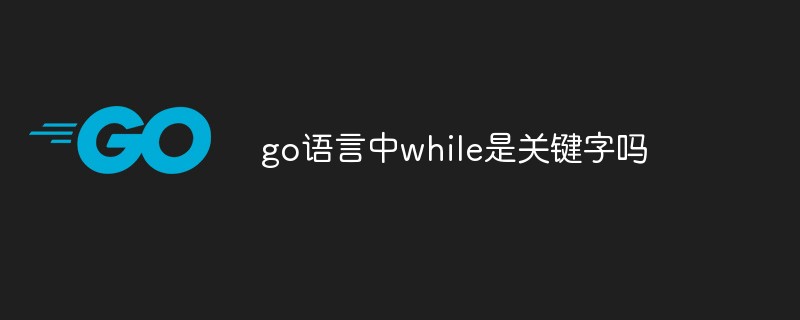Home >Backend Development >Golang >Is while a keyword in go language?
Is while a keyword in go language?
- 青灯夜游Original
- 2021-06-04 17:01:344210browse
In the Go language, while is not a keyword. You can use the for statement plus break to achieve the effect of a while loop, such as "for {sum if sum>10{break}else{...}}". The go language has 25 keywords such as break, default, func, select, case, defer, go, map, else, goto, for, if, var, etc.

The operating environment of this tutorial: Windows 7 system, GO version 1.18, Dell G3 computer.
There is no while keyword in golang, you can use for break to achieve it
Different from most languages, the loop statement in Go language only supports the for keyword, and The while and do-while structures are not supported. The basic usage of the keyword for is very close to that in C language and C:
sum := 0
for i := 0; i < 10; i++ {
sum += i
} You can see that the biggest difference is that the conditional expression after for does not need to be used Surrounded by parentheses (), the Go language further takes into account infinite loop scenarios, so that developers do not have to write boring for(;;){} and do{} while(1); , and is directly simplified to the following writing:
package main
import "fmt"
func main() {
sum := 0
for {
sum ++
if sum > 10{
break
}else{
fmt.Println(sum)
}
}
}Keywords in the go language
Keywords (also called reserved words) are the programming language A sequence of characters reserved for use by programmers as an identifier.
Keywords are words that are given special meanings by the Go language and can also be called reserved words.
There are a total of 25 keywords in the Go language. The reason why the keywords in the Go language are deliberately kept so few is to simplify the code analysis during the compilation process. Like other languages, keywords cannot be used as identifiers.
| Reserved keywords | Description |
|---|---|
| Exit the loop | |
| Select structure default items (switch, select) | |
| Definition Function | |
| Define interface | |
| channel | |
| Select structure tag | |
| Define channel | |
| Constant | |
| Skip this loop | |
| Delay execution Content (finishing work) | |
| Concurrent execution | |
| map type | |
| Define structure | |
| Select structure | |
| Jump statement | |
| Package | |
| Selection structure | ##fallthrough |
| if | |
| range | |
| type | |
| for | |
| import | |
| return | |
| var | |
| Program entity declaration and definition | |
| Program control flow | |
There are 15 keywords in total for program control flow. Among them, go and select are mainly used for concurrent programming in Go language.
Golang tutorial
The above is the detailed content of Is while a keyword in go language?. For more information, please follow other related articles on the PHP Chinese website!

